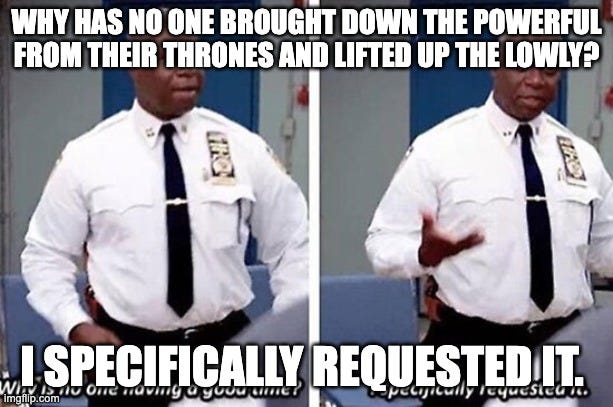The lectionary for the third Sunday of Advent includes one of the most renowned bits of the New Testament: the section of the gospel of Luke called the Song of Mary or the Magnificat. It’s a well-known passage because it has been adapted for musical performances a number of times, and because it expresses an agenda for social change that many readers over the years have found compelling: mercy, strength, bringing down the powerful, filling the hungry, sending the rich away empty, and that kind of thing.
I was thinking about the Magnificat this morning, in relation to some of the distinctive features of Luke and Acts (which most scholars believe were written by the same person, the one we call “Luke,” as part of a two-volume set). As I was thinking about it, I was coming up with some half-formed questions. Luke is renowned for a few thematic and stylistic things: he is known for including women in his stories (even if not always in a narratively well-rounded way), for lifting up justice concerns, and for long, dramatic speeches. There are other idiosyncrasies of Luke, of course, like a focus on Jesus as unjustly accused, an ambivalent concern for the Roman Empire, and an expansive geographical vision. But just taking the gospel’s special interest in women, justice, and speeches, it’s interesting to think about the Magnificat as a place where those all come together.
The Magnificat is modeled on the Song of Hannah, which can be found in 1 Samuel 2:1-10, and which similarly appears as a song of praise for God at the conception of a child. Luke has a tendency to compose speeches for characters in his books based not on historical record (which wouldn’t have been available anyway) but on a sense of what would have been proper for the speech-giver. That might seem dishonest to us today, to just make up a speech for someone based on what you think they should have said, but it was totally normal in the ancient world. The book of Acts is actually a better place to see this in action; there, people like Peter and Paul and Stephen are forever giving dramatic speeches that function as set pieces for the narrative. The Magnificat is kind of like that; the author wrote it, based on the Song of Hannah, to express what Mary’s mindset might have been like in that moment.
It's not surprising that the song includes themes of justice. The Song of Hannah already includes a lot of that, and it matches really well with Luke’s emphasis on what we might call social justice, especially economic justice. So, the Magnificat became a way for Luke to have Mary give a kind of speech (in this case, a song) that emphasizes a key theme while also being really appropriately grounded in tradition.
What’s interesting about this to me, at least this morning, is that it’s probably an example of a man writing in a woman’s voice, something that men are not always good at doing. Let me give a caveat: we don’t actually know that Luke was a man. The gospel itself is anonymous, with later tradition attributing it to Luke, so we are somewhat in the dark about it. But I think it’s very probable that the author was a man, even if he wasn’t a man named Luke, simply based on patterns of literacy and literary production in the first and second centuries. If he was a man, then it becomes really fascinating to watch how he writes women and writes in a woman’s voice. As it turns out, while Luke includes a lot of women in his stories and gives them a bit more literary presence and agency than other gospels, he still does so in a relatively limited way. My favorite example of this is Lydia in Acts 16, who seems to be an important person, has a lot of symbolic significance in the story, and barely gets to speak. That’s pretty par for the course for Lukan women.
Mary, in contrast, gets an extended monologue in the Magnificat. It’s a way to see into the way a first-century (probably) man thinks women think. What does Luke think Mary would have said or should have said, in that situation? Acknowledging the dependence on Hannah’s Song, Luke seems to think that Mary would have thought of herself as “lowly,” and as a “servant.” Is this because of Mary’s social class or status, or because of her gender? It’s an interesting question. Luke also seems to think that, perhaps because of her status, class, or gender, Mary would have been especially concerned with weakness, hunger, and poverty, and opposed to the strong and the rich. Again, it’s interesting to try to disentangle class and gender here; does he think that this is a characteristically female way to think, based on Hannah’s Song, or is this more about Mary’s (or Jesus’) station economically? The later reference to Israel might suggest that it’s more about geopolitics than gender, but there’s something nagging about it for me that pushes me to think about it in terms of gender: Luke is trying to imagine things from the perspective of a woman, and the Magnificat is what you get.
I’m sure there is a ton of great scholarship on this question, which I am now going to have to go and read. (I’m not really a gospels scholar). Feminist critics have taken Luke to task in recent years for a hollow kind of representation of women, in which women are seen but not very much heard in the gospel. I wonder if this is something similar, when Luke has a woman speak, but fills her mouth with words that he imagines would have belonged there, rather than finding out what women’s actual concerns were. Maybe I’m making too much of it. I’m going to do some reading.

